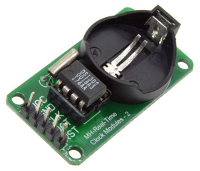This is a 3-wire DS1302 RTC (Real Time Clock) library for Arduino.
Library features
- libc
<time.h> compatible
- Read/write date/time
struct tm
- Set/get Unix epoch UTC
time_t
- Set/get time (hours, minutes, seconds)
- Set/get date and time (hour, min, sec, mday, mon, year, wday)
- Read / write 31 Bytes battery backupped RTC RAM.
- Programmable trickle charge to charge super-caps / lithium batteries.
- Optimized IO interface for Atmel AVR platform.
DS1302 specifications
IMPORTANT NOTES:
- The DS1302 RTC time may deviate >1 minute each day, so this device is not recommended for designs with high precision requirements.
- The high precision DS3231 I2C RTC is recommended for new designs.
- The 3-wire interface is NOT compatible with SPI.
Examples
Arduino IDE | File | Examples | Erriez DS1302 RTC:
Documentation
Usage
Initialization
{c++}
#include <ErriezDS1302.h>
// Connect DS1302 data pin to Arduino DIGITAL pin
#if defined(ARDUINO_ARCH_AVR)
#define DS1302_CLK_PIN 2
#define DS1302_IO_PIN 3
#define DS1302_CE_PIN 4
#elif defined(ARDUINO_ARCH_ESP8266)
#define DS1302_CLK_PIN D4
#define DS1302_IO_PIN D3
#define DS1302_CE_PIN D2
#elif defined(ARDUINO_ARCH_ESP32)
#define DS1302_CLK_PIN 0
#define DS1302_IO_PIN 4
#define DS1302_CE_PIN 5
#else
#error #error "May work, but not tested on this target"
#endif
// Create RTC object
ErriezDS1302 rtc = ErriezDS1302(DS1302_CLK_PIN, DS1302_IO_PIN, DS1302_CE_PIN);
void setup()
{
// Initialize RTC
while (!rtc.begin()) {
Serial.println(F("RTC not found"));
delay(3000);
}
}
Check oscillator status at startup
{c++}
// Check oscillator status
if (!rtc.isRunning()) {
// Error: RTC oscillator stopped. Date/time cannot be trusted.
// Set new date/time before reading date/time.
// Enable oscillator
rtc.clockEnable(true);
}
Set time
{c++}
// Write time to RTC
if (!rtc.setTime(12, 0, 0)) {
// Error: Set time failed
}
Get time
{c++}
uint8_t hour;
uint8_t minute;
uint8_t second;
// Read time from RTC
if (!rtc.getTime(&hour, &minute, &second)) {
// Error: RTC read failed
}
Set date and time
{c++}
// Write RTC date/time: 13:45:09 31 December 2019 0=Sunday, 2=Tuesday
if (!rtc.setDateTime(13, 45, 9, 31, 12, 2019, 2) {
// Error: RTC write failed
}
Get date and time
{c++}
uint8_t hour;
uint8_t min;
uint8_t sec;
uint8_t mday;
uint8_t mon;
uint16_t year;
uint8_t wday;
// Read RTC date/time
if (!rtc.getDateTime(&hour, &min, &sec, &mday, &mon, &year, &wday) {
// Error: RTC read failed
}
// hour: 0..23
// min: 0..59
// sec: 0..59
// mday: 1..31
// mon: 1..12
// year: 2000..2099
// wday: 0..6 (0=Sunday .. 6=Saturday)
Write date/time struct tm
{c++}
struct tm dt;
dt.tm_hour = 12;
dt.tm_min = 34;
dt.tm_sec = 56;
dt.tm_mday = 29;
dt.tm_mon = 1; // 0=January
dt.tm_year = 2020-1900;
dt.tm_wday = 6; // 0=Sunday
if (!rtc.write(&dt)) {
// Error: RTC Read failed
}
Read date/time struct tm
{c++}
struct tm dt;
// Read RTC date/time
if (!rtc.read(&dt)) {
// Error: RTC read failed
}
Read Unix Epoch UTC
{c++}
time_t t;
// Read Unix epoch UTC from RTC
if (!rtc.getEpoch(&t)) {
// Error: RTC read failed
}
Write Unix Epoch UTC
{c++}
// Write Unix epoch UTC to RTC
if (!rtc.setEpoch(1599416430UL)) {
// Error: Set epoch failed
}
Write to RTC RAM
{c++}
// Write Byte to RTC RAM
rtc.writeByteRAM(0x02, 0xA9);
// Write buffer to RTC RAM
uint8_t buf[NUM_DS1302_RAM_REGS] = { 0x00 };
rtc.writeBufferRAM(buf, sizeof(buf));
Read from RTC RAM
{c++}
// Read byte from RTC RAM
uint8_t dataByte = rtc.readByteRAM(0x02);
// Read buffer from RTC RAM
uint8_t buf[NUM_DS1302_RAM_REGS];
rtc.readBufferRAM(buf, sizeof(buf));
Set Trickle Charger
Please refer to the datasheet how to configure the trickle charger.
{c++}
// Disable (default)
rtc.writeRegister(DS1302_REG_TC, DS1302_TCS_DISABLE);
// Minimum 2 Diodes, 8kOhm
rtc.writeRegister(DS1302_REG_TC, 0xAB);
// Maximum 1 Diode, 2kOhm
rtc.writeRegister(DS1302_REG_TC, 0xA5);
Set RTC date and time using Python
Flash Terminal example.
Set COM port in examples/Terminal/Terminal.py Python script.
Run Python script:
{c++}
// Install Pyserial
python3 pip -m pyserial
// Set RTC date and time
python3 Terminal.py
Pin configuration
Note: ESP8266 pin D4 is high during a power cycle / reset / flashing which may corrupt RTC registers. For this reason, pins D2 and D4 are swapped.
| DS1302 Pin | DS1302 IC | Atmel AVR | ESP8266 | ESP32 |
| 4 | GND | GND | GND | GND |
| 8 | VCC2 | 5V (or 3.3V) | 3V3 | 3V3 |
| 7 | SCLK (CLK) | 2 (DIGITAL pin) | D4 | 0 |
| 6 | I/O (DAT) | 3 (DIGITAL pin) | D2 | 5 |
| 5 | CE (RST) | 4 (DIGITAL pin) | D2 | 4 |
API changes v1.0.0 to v2.0.0
The API has been changed to make RTC libraries compatible with libc time.h. This makes it easier to calculate with date/time and port the application to different platforms. See changes below:
| v1.0.0 | v2.0.0 | | ----------------------------—* | --------------------------------------------------------—* | | DS1302_DateTime | struct tm | | | clearOscillatorStopFlag() merged into clockEnable() | | isHalted() | bool clockEnable(bool enable) | | halt() | void isRunning() | | setDateTime() | void write(struct tm *dt) | | getDateTime() | bool read(struct tm *dt) | | getEpochTime() | time_t getEpoch() | | | void setEpoch(time_t t) | | writeProtect() | Removed | | isProtected() | Removed | | | void setDateTime(uint8_t hour, uint8_t min, uint8_t sec, uint8_t mday, uint8_t mon, uint16_t year, uint8_t wday) | | | void getDateTime(uint8_t *hour, uint8_t *min, uint8_t *sec, uint8_t *mday, uint8_t *mon, uint16_t *year, uint8_t *wday) | | ErriezDS3231Debug | class removed to reduce flash size |
Library dependencies
Wire.hTerminal.ino requires ErriezSerialTerminal library.
Library installation
Please refer to the Wiki page.
More Arduino Libraries from Erriez



 1.8.13
1.8.13